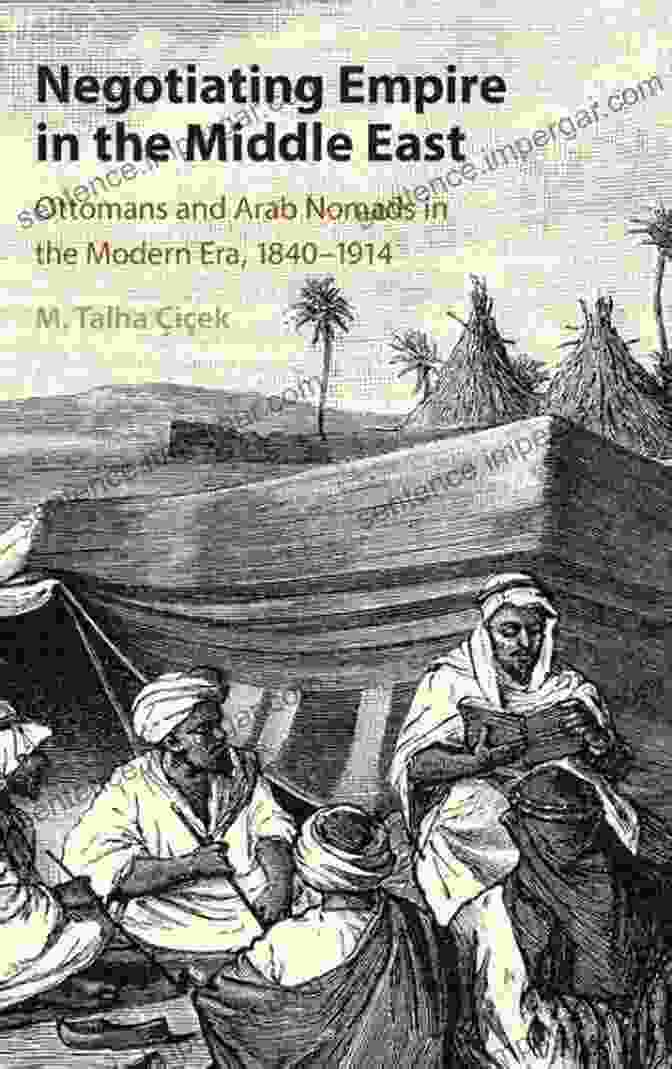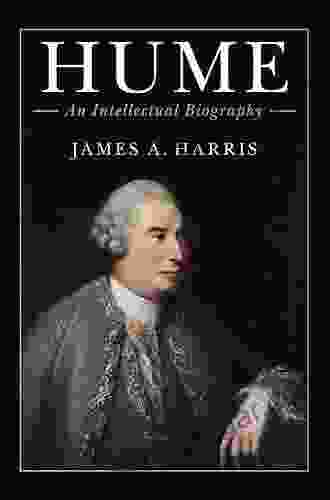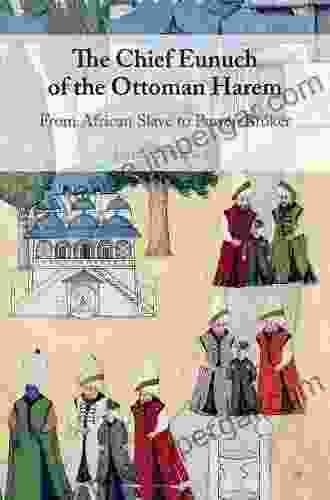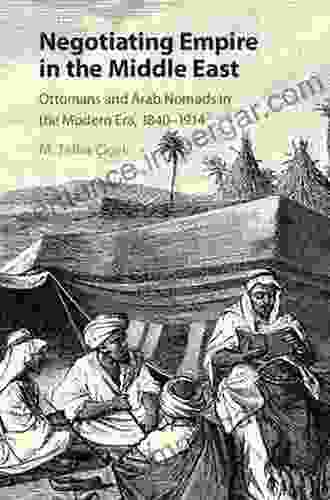Unveiling the Interwoven Destinies: Ottomans and Arab Nomads in the Modern Era (1840-1914)


In the heart of the vibrant Middle East, where the sands whispered tales and the rugged terrain shaped destinies, the Ottoman Empire and Arab nomads navigated an intricate dance of power, influence, and shared experiences from 1840 to 1914.
4.5 out of 5
| Language | : | English |
| File size | : | 11036 KB |
| Text-to-Speech | : | Enabled |
| Screen Reader | : | Supported |
| Enhanced typesetting | : | Enabled |
| Word Wise | : | Enabled |
| Print length | : | 294 pages |
The Ottoman Empire: A Colossal Power in Flux
By the 19th century, the Ottoman Empire spanned three continents, its vast domains extending from the Balkans to North Africa. Yet, despite its immense size and historical prowess, the empire was grappling with internal and external challenges.
The rise of European powers and the burgeoning tide of nationalism posed threats to Ottoman authority. Internal unrest, economic woes, and administrative inefficiencies further weakened the empire's foundations.
Arab Nomads: A Resilient Force in the Desert
Dotting the vast expanse of the Arabian Peninsula and the wider Middle East were Arab nomads, a hardy and adaptable people who had long forged their existence in the unforgiving desert environment.
Pastoralists by nature, these nomads herded livestock, traversing vast distances in search of grazing lands and water. They possessed an intimate knowledge of the terrain, a sharp survival instinct, and a vibrant cultural heritage.
Intertwined Destinies: Ottoman Rule and Nomad Autonomy
The relationship between the Ottoman Empire and Arab nomads was complex and multifaceted. While the Ottomans sought to assert their authority over these nomadic tribes, the nomads fiercely protected their autonomy and traditional way of life.
The Ottomans implemented various measures to pacify and control the nomads, such as establishing military posts, collecting taxes, and instituting loyalty oaths. Yet, the nomads resisted Ottoman attempts to fully integrate them into the empire's centralized administration.
Nomadic Adaptations and Resistance
Faced with Ottoman pressure, Arab nomads displayed remarkable resilience and adaptability. They often sought refuge in remote desert regions, beyond the reach of Ottoman officials and military forces.
They formed alliances with other tribes, engaged in raids for resources, and skillfully employed guerrilla tactics to defend their territories. Their deep-seated attachment to their nomadic lifestyle and cultural heritage fueled their resistance to Ottoman control.
The Ottoman Perspective: Integration and Control
From the Ottoman perspective, the integration of Arab nomads into the empire was seen as essential for consolidating their authority over the vast Arabian Peninsula and maintaining stability in the region.
The Ottomans viewed these nomadic tribes as a source of potential recruits for their military, a resource for taxation, and a means to control the flow of trade and resources in the empire's periphery.
A Period of Transformation and Turmoil
The decades from 1840 to 1914 marked a period of significant transformation and turmoil for both the Ottoman Empire and Arab nomads. The Ottoman Empire struggled to maintain its hold on its vast territories amidst rising nationalist movements and external pressures.
Arab nomads, too, faced challenges as their traditional way of life came under increasing strain from modernization and the encroachment of settled populations. The outbreak of World War I in 1914 would further test the resilience and adaptability of both groups.
: A Legacy of Shared History
The relationship between the Ottomans and Arab nomads in the modern era was a captivating tapestry woven with threads of power, resistance, and resilience. It shaped the destinies of both groups, leaving an enduring legacy that continues to resonate in the Middle East today.
This book delves into the complexities of this historical encounter, exploring the interplay between the Ottoman Empire's ambitions and the fierce autonomy of Arab nomads. It offers a nuanced perspective on a pivotal era in the history of the Middle East, shedding light on the enduring connections between these two distinct yet intertwined communities.
4.5 out of 5
| Language | : | English |
| File size | : | 11036 KB |
| Text-to-Speech | : | Enabled |
| Screen Reader | : | Supported |
| Enhanced typesetting | : | Enabled |
| Word Wise | : | Enabled |
| Print length | : | 294 pages |
Do you want to contribute by writing guest posts on this blog?
Please contact us and send us a resume of previous articles that you have written.
 Book
Book Novel
Novel Page
Page Chapter
Chapter Text
Text Story
Story Genre
Genre Reader
Reader Library
Library Paperback
Paperback E-book
E-book Magazine
Magazine Newspaper
Newspaper Paragraph
Paragraph Sentence
Sentence Bookmark
Bookmark Shelf
Shelf Glossary
Glossary Bibliography
Bibliography Foreword
Foreword Preface
Preface Synopsis
Synopsis Annotation
Annotation Footnote
Footnote Manuscript
Manuscript Scroll
Scroll Codex
Codex Tome
Tome Bestseller
Bestseller Classics
Classics Library card
Library card Narrative
Narrative Biography
Biography Autobiography
Autobiography Memoir
Memoir Reference
Reference Encyclopedia
Encyclopedia Jake Wood
Jake Wood Jean Marc Soboth
Jean Marc Soboth Jeena Cho
Jeena Cho Jean Paul Dubois
Jean Paul Dubois Jason Blume
Jason Blume Javier De Prada Pareja
Javier De Prada Pareja Jay Milbrandt
Jay Milbrandt James Boaden
James Boaden Jay Hasbrouck
Jay Hasbrouck Javed I Khan
Javed I Khan Jeff Guinn
Jeff Guinn Jean Larch
Jean Larch Jane Ridley
Jane Ridley Janet Chrzan
Janet Chrzan Jay M Templin
Jay M Templin Jean Michel Servais
Jean Michel Servais James Jacques
James Jacques James A Harris
James A Harris Jean Baur
Jean Baur Jane Hampton Cook
Jane Hampton Cook
Light bulbAdvertise smarter! Our strategic ad space ensures maximum exposure. Reserve your spot today!

 Herman MelvilleGlobal Perspectives on Research Policy and Practice Textbooks in Family...
Herman MelvilleGlobal Perspectives on Research Policy and Practice Textbooks in Family...
 Graham BlairDiscover the Extraordinary World of Machines with "The Reassembler" by James...
Graham BlairDiscover the Extraordinary World of Machines with "The Reassembler" by James...
 Hunter MitchellHume: An Intellectual Biography by James Harris - Unveiling the Life and...
Hunter MitchellHume: An Intellectual Biography by James Harris - Unveiling the Life and...
 Roland HayesThe Secret World of the Ottoman Harem: Unveiling the Life of the Chief Eunuch
Roland HayesThe Secret World of the Ottoman Harem: Unveiling the Life of the Chief Eunuch Braden WardFollow ·15k
Braden WardFollow ·15k Bobby HowardFollow ·16.1k
Bobby HowardFollow ·16.1k Thomas PowellFollow ·12.4k
Thomas PowellFollow ·12.4k Rob FosterFollow ·2.8k
Rob FosterFollow ·2.8k Norman ButlerFollow ·16.8k
Norman ButlerFollow ·16.8k Forrest BlairFollow ·14.1k
Forrest BlairFollow ·14.1k Felipe BlairFollow ·17.5k
Felipe BlairFollow ·17.5k E.M. ForsterFollow ·7.3k
E.M. ForsterFollow ·7.3k

 Jacob Foster
Jacob FosterPrinciples and Persons: The Legacy of Derek Parfit
Derek Parfit's 1984 book,...

 Leo Mitchell
Leo MitchellPartners For Life: Raise Support For Your Missionary Work...
Are you a missionary or ministry leader...

 Blake Kennedy
Blake KennedyOn Desperate Ground: A Gripping Account of World War II's...
Hampton Sides' "On...

 Duane Kelly
Duane KellyCriminal Minds Sociopaths Serial Killers And Other...
In the realm of criminology,...

 Craig Blair
Craig BlairHome Repair: The Ultimate Guide to Fix, Maintain, and...
Welcome to the...

 Elmer Powell
Elmer PowellThe Organic Grower Guide to Mycorrhizae Science for...
Unlock the Secrets of Soil...
4.5 out of 5
| Language | : | English |
| File size | : | 11036 KB |
| Text-to-Speech | : | Enabled |
| Screen Reader | : | Supported |
| Enhanced typesetting | : | Enabled |
| Word Wise | : | Enabled |
| Print length | : | 294 pages |




